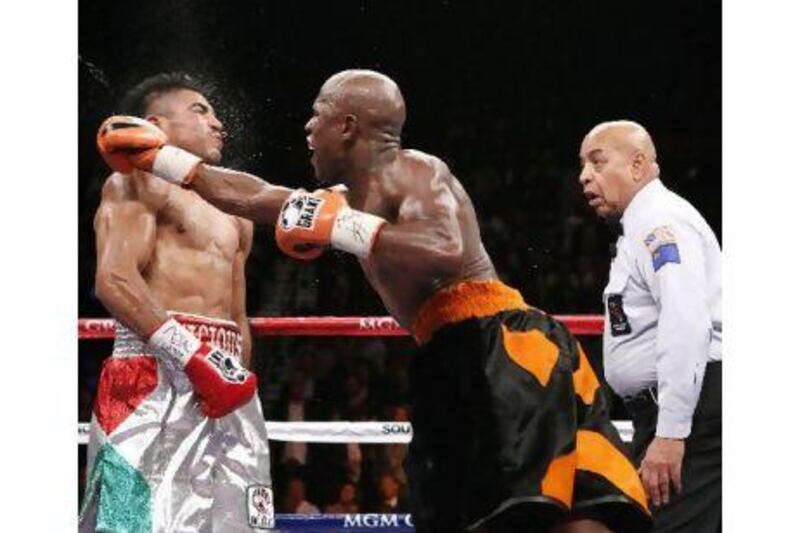If you happen to be one of those people who seeks farcical disappointment in life, you might try following boxing.
Interactive: The Manny Pacquiao Story
A four-part exclusive report from the Philippines on the people, places and culture that inspired the championship boxer's remarkable life, with stories, photos and videos
The sport never seems depleted of its stash of farcical disappointment, as if mandated through some cheeky Department of Farcical Disappointment.
As a matter of personal taste, I try to avoid farcical disappointment with no disrespect for its enthusiasts, yet six months ago I stumbled into boxing interest when I wandered into the Philippines, and found the world's best sport storyline in Manny Pacquiao.
After that, it took merely two months of following boxing in earnest to come upon the minor absurdity of Pacquiao versus Shane Mosley, and it took six months to find the sort of glaring absurdity that pockmarks both the sport and the Floyd Mayweather versus Victor Ortiz outcome of Saturday night in Las Vegas.
Now, old men and older men long have spoken of the middle of last century, when boxing reigned with glamour and import.
By the time most of us in the world today reached voting age, however, it had gone well into its diligent self-immolation with only the most ingenious savant able to name the title-holders in all the WB-this and WB-that alphabetical strains.
It had become such a niche that even generalist sportswriters did not have to pay it any attention north of scant.
Easily could you count yourself as a sports follower, yet wind up watching, in 2011, the excellent film The Fighter without knowing who won any of the actual fights depicted. Such a quirk will not be happening in 10 years if somebody makes a film of, say, either of the Champions League finals between Barcelona and Manchester United.
Still, I always did figure the sport contained a lot more than its most-remembered moment of the last 20 years, that of one boxer biting his opponent's ear. I always did keep an admiration for the courage of the contestants.
Then I found Planet Pacquaio, saw the grimy street kids selling food in Manila, tried to process the astounding fact that Pacquiao had been one, and began trying to keep up with the game through his prism.
Already so far, that has brought a trip clear around the world to Las Vegas to watch Mosley spend 12 rounds avoiding Pacquiao as if wanting to get the money and get out of there.
Most any of us would take that tack, but most any of us are not "Sugar" Shane Mosley, and even Pacquiao found it frustrating in victory.
Then came Saturday night, which I followed in that most timeworn of ways - by internet - and which apparently proved worth the pay-per-view fee for those who relish fiascos.
In the fourth round Mayweather pounded his rival, Ortiz illegally butted Mayweather, Joe Cortez, the referee, halted matters to deduct a point from Ortiz and, in the moment before resumption with Cortez still distracted as Ortiz waited, Mayweather went ahead and knocked out Ortiz.
It wasn't illegal, but it also wasn't impressive or even sport.
And before everybody from Pacquiao to Dana White, the Ultimate Fighting Championship president, could cite everything from poor sportsmanship (Pacquiao's view) to lousy refereeing (White's view), the 80-year-old HBO reporter Larry Merchant would seek post-bout interviews.
Mayweather would whine to Merchant about Merchant's insufficient worship of Mayweather, and Merchant would tell Mayweather one of the great, farcical lines of the era, the one holding that if Merchant were 50 years younger, he would thrash Mayweather.
Like most reality television, then, the whole episode lent an eerie fascination while doubling as a runaway waste of time.
Boos rained down as Mayweather improved either to 42-0 with 26 knockouts, or to 41-0 with 25 knockouts and one unusually dubious farce.
The imaginary bout forever looming beyond the rainbow, Mayweather versus Pacquiao, also lost even more traction as Mayweather treated press listeners to another monologue alleging both Pacquiao's insignificance and performance-enhancing drugs, citing Pacquiao's 10-year gain from roughly 100 pounds to roughly 150.
And while nobody anymore should reel from naivety should any big-time athlete prove to have ingested futuristic pharmaceuticals, Mayweather hardly qualifies in expertise (with body type not the crucial focus of present-day drugs) or in morality (owns 29 cars) or in wisdom (already facing Pacquiao's defamation lawsuit for similar allegations).
I do relish the candour. I do relish the unapologetic acknowledgement of real life, maybe even that searing scene in HBO's 24/7 documentary when Mayweather vulgarly expels his father from the gym.
It's just that, as a sport, boxing clings doggedly to a peerless capacity to deflate.
Follow
The National Sport
on
[ @SprtNationalUAE ]
& Chuck Culpepper on
[ @DubaiChuck ]
__________________________________________
The Manny Pacquiao Story
• Interactive: The Manny Pacquiao story
• Part one of the Pacquiao story: In Mannyland
• Part two of the Pacquiao story: Unchanged by fame
• Part three of the Pacquiao story: Team Pacquiao
• Part four of the Pacquiao story: A bittersweet farewell to Manny Pacquiao
• Pacquiao's promoters keen to push through fight in Abu Dhabi
• He's the best, but Manny Pacquiao is still learning to be better
__________________________________________





